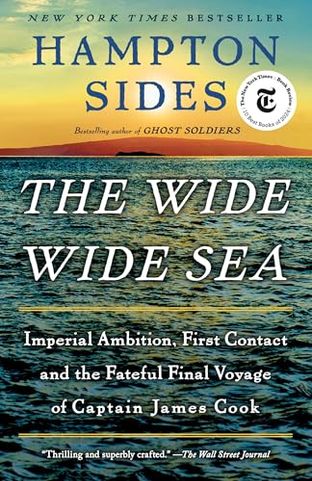Review of THE WIDE WIDE SEA
by Johny McFliggen, PhD Literature & Business, Oxford
In a literary world saturated with rehashed tales of historical figures, Hampton Sides' "THE WIDE WIDE SEA" attempts to chart a fresh course through the tempestuous waters of Captain James Cook's final voyage. Known for his masterful narrative style in works like "On Desperate Ground," Sides takes on the ambitious task of navigating both the literal and metaphorical wide sea that defines Cook's controversial legacy.
The book, which seemingly emerges from the depths like a long-lost artifact, offers a comprehensive yet intimate exploration of a voyage that has been dissected and debated ad nauseam. Yet, in true Sides fashion, it is the nuance and detail that breathe new life into this well-trodden subject. One might compare Sides' approach to Cook with Ron Chernow's treatment of Alexander Hamilton—reverent yet unflinchingly critical. The narrative is as much about the man as it is about the myth, and Sides adeptly balances the two.
In delving into Cook's final voyage, Sides does not shy away from the controversies that have dogged the explorer's legacy. He tackles the moral complexities surrounding Cook with the same rigor that historians like David McCullough apply to American founding fathers in "1776." These are not mere historical footnotes but essential threads in a tapestry that seeks to understand the intersection of exploration, imperialism, and cultural encounter.
Sides' portrayal is reminiscent of the rich, immersive storytelling found in Nathaniel Philbrick's "In the Heart of the Sea," where every page seems to salt your lips and fill your lungs with briny air. The author conjures an era of exploration with such vividness that one can almost hear the creaking of the Endeavour's masts amid a backdrop of diplomatic fumbling and cross-cultural collisions.
However, unlike many historical narratives that conveniently sanitize their subjects for modern sensibilities, Sides presents Cook as a flawed yet fascinating figure. In doing so, he echoes the thematic complexity found in Hilary Mantel’s depiction of Thomas Cromwell in "Wolf Hall." The result is a portrait that invites readers to grapple with the uncomfortable truths of history rather than indulge in hero-worship or blanket condemnation.
While some might argue that Sides occasionally indulges in minute historical details at the expense of narrative pace, this meticulousness is precisely what allows "THE WIDE WIDE SEA" to transcend mere recounting. It is an intellectual endeavor that demands patience, much like a symphony requiring one to savor every note.
In conclusion, "THE WIDE WIDE SEA" stands as a testament to Hampton Sides' mastery of narrative non-fiction. It is an invitation to journey beyond the horizon of established history into the murky, uncharted waters where fact meets interpretation. For those willing to embark on this intellectual voyage, be prepared: you may find yourself revisiting what you thought you knew about Captain Cook and questioning where history ends and legend begins.
Purchase Link: THE WIDE WIDE SEA on Amazon



